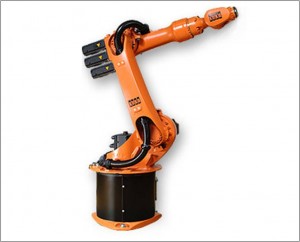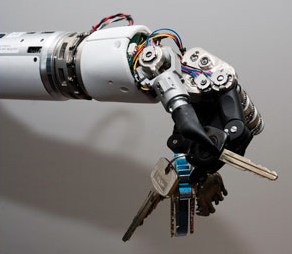or Mechatronic Engineering, humourously (but incorrectly) referred to as Megatronics at times. In Afrikaans Megatronika or Megatroniese Ingenieurswese. What is it? What can you do with it? When I started studying I didn’t know, after 5 years I think I have a vague idea. So below I’m going to post what I know.
In it’s simplest form it’s a combination of Mechanical and Electronic Engineering. If I really don’t feel like explaining, I simplify it to robotics. This is certainly a large portion of Mechatronics, but by no means a limiting factor.
Mechatronics as a named profession is fairly new, but the idea has always been there. In the South African context, UCT have had an accredited BSc (Eng) Mechatronics course since 1997 (although how long it has actually been running is uncertain), NMMU a BEng since 2007 (first graduates) and Stellenbosch since 2005 [1]. Potchefstroom University (NWU) are apparently aiming to start a course in the next few years [2]. Although not offered in the BEng format, UKZN do offer Masters through their Mechatronics and Robotic Research Group [3]. [EDIT: added list of BTech degrees and Diplomas offered at the bottom of the post]
Mechatronics at Stellenbosch [2]
I completed my BEng Mechatronics at Stellenbosch University in 2011. The Mechatronics course was presented by the Department of Mechanical and Mechatronic Engineering in a four year course. The first two years were identical to that of those studying towards a BEng Mechanical. The first year course is identical for all engineering students. In the third and fourth years, the two courses still followed similar routes, with the Mechatronics course replacing several Mechanical courses with some courses presented by the Department of Electronic and Electrical Engineering. In third year these included Electronics and Computer System’s courses and fourth year Electronics and Electronic Design Courses. Losing out on some Strength of Materials and Thermo-Fluid Mechanics.
The department put it this way [6]
The most important difference between the mechanical engineering programme and the mechatronic programme is that mechanical engineers are equipped to develop mechatronic systems with existing controllers (computers, PLC’s, etc.), while mechatronic engineers are also equipped to develop specialised controllers (e.g. for embedded controllers) and the relevant electronics themselves.
At the time, the Head of Department felt that Mechatronics as an entity was still too new. Employers weren’t advertising for Mechatronic Engineers, and didn’t really know what to do with them when they did get them. This resulted in the close ties between the Mechanical and Mechatronic courses. I was often unhappy about this, having would of preferred more focus on the Electronics, but in the end it worked out. And the HoD’s opinions were/are valid.
When I chose Mechatronics, I didn’t know where I was going to work, I chose the course because it sounded interesting. It wasn’t until my final year that I found a direction to work towards. Course setups at different universities are going to be different, and will put emphasis on different subjects, that doesn’t necessarily make one better than the other. Either way you’re going to come out of it with a degree and a fair amount of knowledge. Most importantly though (and this is true for any engineering degree) is you’ll know how to learn.
I’m quite confident that specific things that I learn in my first year of work will be of more value to my career than a specific subject at varsity, but having struggled through several subjects, I know I can figure out most things that come my way. I know where to look and how to go about solving problems.
In my final year we were a class of 85 Mechanical/Mechatronic students, of which I’d say about 30-35 received their BEng Mechatronics in 2011.
Mechatronics at NMMU [2]
NMMU have a slightly different setup. Mechatronics is presented by the Mechatronics school of the Department of Engineering, the Built Environment and IT. Mechatronics is the only Engineering degree they offer. As such, first year physics and maths are taken alongside BSc students and after the first year, courses taken are aimed only at Mechatronics students. The format of the course is still identical to that of when it started giving a good balance of subjects. The University also offers an array of BTech degrees in other Engineering fields.
I’m currently pursuing my master’s degree at NMMU. Their 4th year BEng Mechatronics class has roughly 25 students in it and the 3rd year class about 30. First year applications are limited to 60, with the most recent 1st year class starting with 50 students. The Mechatronics department is currently sponsored by General Motors South Africa (who have a plant in PE) and also have close ties to the Volkswagen plant in Uitenhage.
Mechatronics in General
Mechatronics as a career is still finding its feet. Meaning many consider it a jack of all trades, master of none type of situation, and although the course may feel that way, it’s certainly not the end of the story.
Mechatronics isn’t a new field, it’s just finally been given a name. When you tell people you’re a Mechatronic Engineer they don’t know what that is. I had a month stint at a large production facility as part of vacation training and I was asked to choose between focusing on their Mechanical or Electrical divisions, eventually settling for a bit of time at each. But that’s how businesses in SA are structured. This will change.
Several Mechatronic Engineers that I know have taken up Automation maintenance posts. Nothing wrong with this, personally it’s not where I want to be. Contrary to this though, my first job next year will be in automation maintenance. I however plan to use this as a stepping stone into a design career.
Automation is fun, and whereas I am going into automation in a production sense, automation also relates to smaller and/or more technical situations. The recent landing of the Curiosity rover on Mars is a perfect example of Mechatronic systems. There are several elements here, from the automated landing system to the remote control of the device.
In the motor industry, systems such as traction control, ABS and ESP are all examples of Mechatronic systems. Heavily complicated systems that rely on the processing of data from sensors to enable control of actuators. As such a Mechatronic Engineer can make him/herself home in many different industries. These include the Automotive, Aerospace, Manufacturing, Medical and Communications Industries.
Mechatronic Engineers can register with ECSA to become Professional Engineers [4]. The industry is governed by the South African Institute for Mechanical Engineers. I don’t see Mechatronics separating from this tree any time soon. The degree, being accredited by ECSA also means that the degree will be recognised internationally in many countries thanks to the Washington, Sydney and Dublin Accords [5]
So what do you do when you have your degree? You do whatever you want. You’ll find something. I’m not aware of any of my colleagues who are currently not pursuing a post-graduate degree or are employed. Not all of them are in Mechatronic specific posts. Some have opted for more mechanical orientated jobs, while others have gone entirely into areas such as electronic design or programming. And that’s one thing, a degree in Mechatronic Engineering in no way limits you. Very few engineering degrees will actually.
After re-reading what I’ve written, I think I’ve put forward some information relating to Mechatronic Engineering, but it’s still left fairly vague, maybe it’s just because none of us know what we’re really doing :)
A National Diploma in Mechatronics (for registration as a Professional Engineering Technician) can also be had from the following institutions [7]:
- Tshwane University of Technology
- UNISA
- Cape Peninsula University of Technology
A BTech in Mechatronics (for registration as a Professional Engineering Technologist) from [8]:
- Tshwane University of Technology
- UNISA
- Cape Peninsula University of Technology
and to reiterate, a BEng, or BScEng (for registration as a Professional Engineer) [1]:
- Stellenbosch University
- University of Cape Town
- Nelson Mandela Metropolitan University
Note: Although other institutions may offer courses in Mechatronics, or Mechanical Engineering with a focus on Mechatronic elements, the ones listed above are the only ones recognised by ECSA for registration as a mechatronic professional. Information was correct at time of posting, but may have changed since.
There are also several Universities of Technology and FET Colleges which offer courses in Mechatronics. CPUT is one of these institutions. Another training institution is Umbilo Training Specialists in Durban. They are running a free training course, once a month where anyone can come to learn more and expand their knowledge. Checkout their page for details.
For some more reading and a very complimentary view with some poignant remarks have a read here.
As part of my degree at Stellenbosch University I completed a project which can be seen here.
As part of my master’s degree at NMMU I completed a project which can be seen here and here.
If you’re looking for bursaries, try this website.
If you have any questions, feel free to ask in the comments section.
- [1] ECSA – Accredited Universities
- [2] Much of what is stated comes from my own experiences and conversations with relevant people.
- [3] UKZN – Mechatronics and Robotics
- [4] ECSA – Registration
- [5] ECSA – Recognised Qualifications
- [6] Stellenbosch University – Mechatronic Engineering
- [7] ECSA – Accredited Diplomas
- [8] ECSA – Accredited BTech





Hi Gareth. I will be starting my classes in Manipal University,Jaipur,India ( if u have heard about this university) for btech in mechatronics. Im very fond of this branch.But to whomever i tell here about my branch they give such dazed looks as it is a less popular branch here. They tell me that u have taken a risky branch u should hv rather gone for core branches.They also say u’ll be the jack of all trades and master of none.This annoys me nd frightens me too, as to after completing the course the companies to which i may apply may reject me as i am not of a particular field like either of core mechanical or electronics. But most probably i m taking this branch only then i have planned to surely move abroad for my masters. Firstly kindly tell me that should i leave this branch because its not popular here in India and my friends and relative say so?(as they also say Computer science is much more paying these days but it doesnt appeals me) Secondly suggest me countries where i can pursue my masters after my btech nd also mention there requirements if u r specifying the name of the colleges my prority will be USA , Germany and Canada( but germany keeps its criteria high like u have to score 8.5 cgpa nd above which i think is tougher to get )One more thing,i would also like to do my MBA after my masters ….tell me that which would be better?masters, MBA or both ( considering i would like to work in corporate world after my studies). Reply ASAP.
Hi Sahil
I’m not going to tell you to leave Mechatronics, but nor am I going to tell you to study it. If Computer Science doesn’t appeal to you, rather go with Mechatronics. As I mentioned in a previous comment, studying a ‘core’ discipline isn’t necessarily beneficial, if you want to study Mechatronics, go for it, you shouldn’t have problems getting a job.
You can pursue your masters in any pretty much any country. Most universities internationally will be open to international students as long as you meet specific requirements. Once you have your first degree, look at universities with ties to your home university, makes it easier to get in. Also you’ll most likely have a better idea of the kind of work you want to go into, so look for an institution that maybe has specialities in that discipline.
If you want to get more into business and corporate, an MBA would probably be a better choice, but also look into Industrial Engineering or Project Management degrees along the same line.
Thnx a lot Gareth. I also want to ask you that if i do MBA after doing masters will i have an edge in job from others as i will be specialized in Mechatronics as well can handle the marketing area of that company. Or just MBA after my btech will do the same.( I want to be in the production as well as in the marketing side of the company i join)
Hey Sahil
While anything extra on your CV will give you an edge over others, if you’re wanting to get more into management side of things, whether linked to production or not, the Masters will probably just be superfluous. That being said, I don’t really have experience in that regard, I’m still young, and not that interested in the management side of things.
Oh!Thanx a lot Gareth!Will be troubling you again if i need your help!!!
Hi Gareth
I am currently in my first year of study at UCT… doing Mechatronics. I need to find vac work for the end of year holidays, do you have any suggestions as to where and how I can apply? And if you have any contacts that could be useful for me? Thank you so much!
This page is very interesting, thank you.
Teagan
Hey Teagan
Getting vac work was always a mission for me too. Unfortuantely I don’t have much help in that regard. The first two times I got vac work, both times it was through family friends and things. And the third time it was through the company I managed to get a bursary through. But look for companies in your area that have some kind of connection to your area of studies, even if it’s not necessarily up your line of interest, vac work often opens you up to other areas of your discipline that you weren’t necessarily aware of.
Good luck.
Hi Gareth – my nephew is currently in Gr 12 and wanting to study mechatronics at stellenbosch next year. our problem is that he needs a bursary (financial aid) as he is an orphan with no parents. Not many companies offer mechatronics bursaries, so I was wondering is it possible that for first year he applies for mechanical engineering or elect engineering and then would he be able to branch off into mechatronics from there later on? any info you can give would help. Also do you recommned Stellies as the preferred institution for mechatronics? what about CPUT? much thanks V
Hi Virna
You’re right very few companies do advertise for mechatronic bursaries. It would probably be easier to start off mechanical to get a bursary and switch at a later stage, but even if he’s applied for mechatronics, he’s still open to applying for bursaries to companies looking for other disciplines.
As for preferred institution. It depends a bit on where his fancy lies. Stellenbosch is more mechanically focused, UCT more electronics and NMMU a bit more in the middle and aimed towards Automation. I can’t speak much for other institutions, CPUT don’t offer a BEng in Mechatronics, but one can do a diploma and follow it up with a BTech. Stellenbosch and UCT would probably be top of my list, but there are many other factors to consider such as accommodation, vicinity, where friends go etc.
Dear Gareth
My son is now 3 rd year Megatronics at Stellenboch.
Which companies can i contact for holiday work for him.
Regards
Hein Koegelenberg
Hi Hein
Unfortunately I can’t help too much. There are quite a few engineering firms around Stellenbosch, he should try just giving them a call.
See my earlier reply on this topic here
Sir I have a question. I am doing B.Eng in mechatronics but I want to do job as transportation desiger in automotive industry. Is there any possibility to get my dream job after my B.Eng in mechatronics ?
Thanks
Definitely, I don’t see any reason why not. See what final year projects are available and try pick one in a related field.
Good luck
My son is currently studying toward a National Diploma in Mechatronics at DUT, after which he could go towards his Btech. He got accepted for a Bsc Computer science and information technology at UKZN for next year. Choices, choices…whats your input ito job prospects and salaries etc. Thanks
Hi. Both choices are good choices, will take him into slightly different industries, but job prospects for both are good and don’t think there’ll be too much in the salary, more dependant on the job choice than the qualification. Not much help I know but, both are good choices.
Hi Gareth!
I have sent you an email. Hoping to receive a response soon :)
Received and answered.
Gareth i need your advise.
I did Electrical Engineering N-course so now am not yet working on Electrical Industry, so I decided to study Degree @ unisa by distance learning.
I would like you to tell me more about advantages and disadvantages of distance learning.
advantages is that you can do it in your own time, and part time while working.
disadvantages is that you don’t have direct access to a lecturer and resources, as well as the extra required self control to force yourself to work and study at the correct pace.
I would like to find out where one can do training on the following subject:
Computer Integrated Manufacturing
Hey George, sorry I’m not sure of a specific course, but you can contact one of the following organisations that might be able to help you:
SAIME
UNISA
ECSA
Are you wanting to specialise in a specific area of CIM?